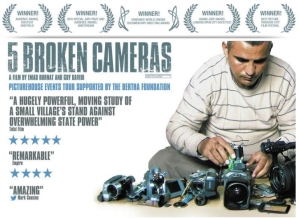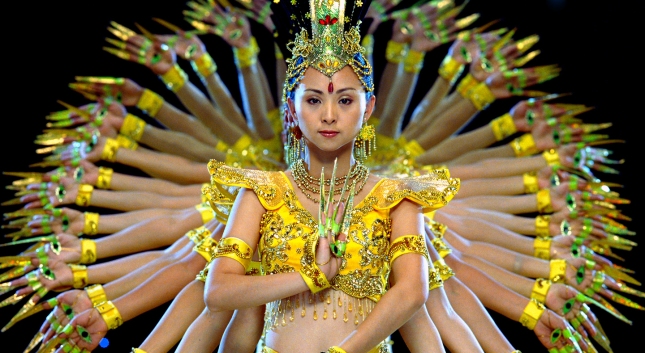https://kendalfilmproduction.wordpress.com/2015/03/19/5-broken-cameras/

http://www.bbc.co.uk/newsround/20436092
http://edition.cnn.com/2012/11/16/world/meast/hamas-explainer/
http://news.bbc.co.uk/1/shared/spl/hi/middle_east/03/v3_ip_timeline/html/
http://www.infoplease.com/world/countries/israel-palestine-conflict/history-since-2011.html
The history of the conflict between Israel and Palastine dates back to then end of the second world war. The Jews who had been blamed as responsible for the loss of the first world war by Germany, suffered heavily at the hands of the Germans both before and after the start of the second world war. Following Germany’s loss, the Jews wanted their own country. They then received a large area of Palestine, despite many Arabs living their already.
Then in 1948, only several years after the end of the second world war, another war broke out, this time between Israel and many of it’s neighboring countries. After the end of this war, Gaza was controlled by Egypt, and Jordan was in control of the West Bank. This lead to many Palestinians fleeing to Israel.
In 1967, following the events of yet another war between the neighboring counties, Israel occupied all the nearby Palestinian areas.
In 2005, the Israeli’s left Gaza. But this would not last for long as a group known as Hamas, who are led by many radical Palestinians, won local elections and took control of Gaza. This means that Israel has been holding Gaza under a blockade and taking control of who enters and leaves the area. Israel holds down Gaza using a military presence. Something that the Palestinians don’t really have.
Since 2011 the ongoing fighting has continued between Israel and Palestine including many bombings, attacks. But in September of 2011, the Palestinian authority wanted recognition of Palestinian statehood. This was unsuccessful, however Palestine was membership of Unesco. Palestine later became a non member observer state in the U.S. Afterwards Israel was approved of building houses in the E1 area. Most of the resulting events since 5 broken cameras have been news of attacks and deaths by many on both sides, both civilians and political members.
Critical analysis
I think that the documentary had many overarching themes, but it’s most important themes were peace, family and persistence. The story was being told by someone who wasn’t of violence. He was a within a group of people that used various forms of peaceful protest to ‘rebel’ and fight for their cause. And so this really gave the viewers an idea of family between the many friends within the group, and it also gave the viewers a sense of peace and harmony. Since that it what everyone will be after, ‘peace’, however it doesn’t look like it will be coming to that any time soon. It felt like the cause was relatable because of everyone who was supporting it. They were peaceful, friendly people who just wanted to have to land back, as would anyone else who was in the same situation. But his actual family were on screen a lot of the time as well and they unlike the filmmaker himself provided a strong narrative, as we didn’t see him much (as he was filming). The film was split between the time spent with his real family and those who he considers as family. Though each family offered something different to the video as a whole. His real family seemed more ‘vulnerable’ seeing as many of them were children. Because of the vulnerability and how fragile a child’s life can be, it felt like that was the more important of the two. Persistence was also a strong theme since a lot of the film was basically just repeats of events that had taken place before. It was basically a seesaw. One side makes a move, another side protests, another side makes a move, another side protests, and on and on.
Obviously it was an emotional film, but I don’t think that you could make a film about war and for it not to be emotional. At the same time, I don’t think that the filmmaker himself made this film to say, look at them, they are really bad. I think that his intentions were to make a film that would benefit both sides in terms of a peace treaty of some sort. You can see that he used the film to get more people rallying peaceful protests. I think he made the film in the hope that outside countries would see it, but I don’t think that he would have realised that outside countries would have seen it.
I think that the film had a massive influence on fellow palestinians, as witnessed in the film, but I think that as an inside source, the film is going to have a huge impact seeing as it isn’t a film that has been produced by an outside source and will have had the whole issue of ‘your taking sides’ kind of thing, but although as is obvious, the filmmaker himself is on one of the sides, I don’t think that he is being really uneven towards the other side in the film, seeing as he doesn’t really feature, so he is just observing his sides point of view.
I think that the format of the film was a little strange seeing as the film builds up going from camera 1 to 5, but it repeats very similar events in each of these sections. However I don’t think that it was going to change. It would have been drastic if it had changed, because in order to do so, I think that the filmmakers personally and morale choices would have taken a u-turn in the other direction.


